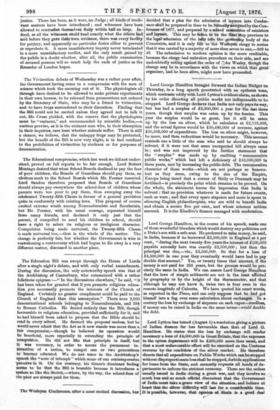Lord George Hamilton brought forward the Indian Budget on Thursday,
in a long speech penetrated with an optimist tone, which contrasts oddly with Lord Lytton's evident alarm, as shown by his order directing all public works not indispensable to be stopped. Lord George declares that India not only pays its way, but has had a surplus of £2,300,000 a year for the last three years, though that surplus was eaten up by the famine. This year the surplus would be as great, but it will be eaten up by the loss on silver, which he calculates at £2,113,000, and the actual figures would be £50,480,000 of revenue, against £50,336,000 of expenditure. The loss on silver might, however, be more, and then reductions would be necessary. This account reminds one a little of the man who said he should always be solvent, if it were not that some unexpected bill always came in ; and was not improved by the further statement that the " surplus " was made up by omitting "remunerative public works," which had left a deficiency of 110,000,000 in three years, met by increasing the public debt. The remunerative character of these works—which are not perhaps so benevo- lent as they seem, owing to the size of the Empire, Europe being taxed that a corner of Sicily or Denmark may be fertilised—is precisely the point which remains to be proved. On the whole, the statement leaves the impression that India is solvent ; that no provision whatever is made for future events, such as wars ; and that every spare sixpence and more is spent in silencing English philanthropists, who are wild to benefit India and obtain a secure five per cent., and whose schemes seldom succeed. It is the Khedive's finance managed with moderation.






























 Previous page
Previous page